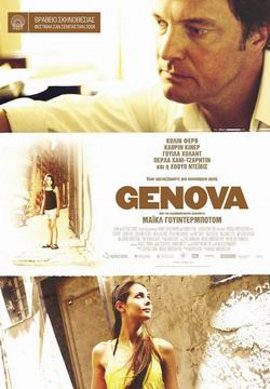
GENOVA
UK, 2008, 94 minutes, Colour.
Colin Firth, Catherine Keener, Hope Davis, Willa Holland, Pearler Haney- Jardine.
Directed by Michael Winterbottom.
There are so many films that don't leap off the advertisement as 'must see' but, if you happen into them or, later, see them on television or rent them, you are glad that you did. Not everyone will like them. It depends on interests and moods. Genova is one of those films. I am glad I saw it.
The Genova of the title is indeed the city anglicised as Genoa. It is not the most beautiful of Italian cities but it has a great deal of history (Columbus, trade...) and atmosphere. By the end of the film, we do feel that we have visited and lived in the city for a while and have a feel for it and the surrounding sea and beaches and mountains.
Michael Winterbottom makes all kinds of genre films (political like The Road to Guantanomo, In This World), dramas (Wonderland), classic comedy (A Cock and Bull Story). This time it is a family drama.
When the mother (Hope Davis) is killed in a car accident, the father (Colin Firth) decides to take his two daughters from Chicago to Genova where he will lecture at the university, with the help of an old friend (Catherine Keener) and the two girls will go to school there.
There is a lot of edginess because the younger daughter blames herself for her mother's death and suffers from nightmares and sees her mother sometimes in the streets. The older daughter blames her sister and is at that precocious teen age where she wants to be with boys, lies to her father and pressurises her sister to conceal her behaviour. Father and daughters are still grieving and, despite counselling, have not come to terms at all with their mother's death and absence. Genova is both a welcoming city for them to make a new start but the camera keeps reminding us that it can also be sinister, with its narrow alleys and darkness where people can get lost.
Colin Firth has one of his better roles. Catherine Keener is always good. The two girls, however, are very real. Willa Raymond is the pretty, pouting and wilful teenager and Perla Haney- Jardine is a strong screen presence and communicates her fears, her guilty feelings, he nightmares and her sobs most convincingly.
Most audiences will be able to identify with the situations and find a character that they empathise with and understand.
1.A focus on family, grief, coping, not coping, change?
2.The American sequences, the Chicago scenes? The contrast with Italy, Genova, the visuals, the views, the monuments and ancient city, the modern city, the wharves, the alleys, school, university, restaurants? Genova’s reputation?
3.The background of the mountains, the beach, the sea and its beauty? Musical score?
4.The prologue: Marianne and her playing the games with her children in the car, Kelly and her being right, Mary and her enjoying the games? Putting her hands on her mother’s eyes? The crash? The funeral and the grief?
5.Joe, his love for his wife, his daughters, grief, at the funeral, at the gathering, people offering their sympathy? The effect on him?
6.His decision to go to Italy with the children? The reasons? Barbara and the help with the university post, their going to school, spending the summer?
7.Barbaray as good friend, the background of her friendship with Joe at college, her work, her being a good tour guide, finding the apartment, going on the outings? Mary and the explanations of the church, the candles, the painting of the Annunciation? Mary liking listening to Barbara? Joe and his memories, Barbara and her attraction to Joe, his resisting, even hurting her after what she had done? At the beach, walking with Mary, the church, talking about Mary’s feelings of guilt, the candle, Mary running away, losing her, the search? Relief at Mary being found? Kelly’s piano recital? A strong portrait of friendship?
8.Joe, the tutorials, the students, discussions about Europe? Friendship with Rose? The coffee, at the beach, the lunch with her, flirting and kissing?
9.Mary, her age, her feelings of responsibility, the counselling after her mother’s death, her frequent nightmares, waking up, calling out, the deep sobs in the night? Her going to Italy, polite, poised, the piano lessons, the teacher and his help, playing with the children, walking home, the alleys, discovering Kelly with the boy, Kelly’s threats? The church, the candles, her prayer, faith? Listening to Barbara’s explanations? At the beach, enjoying the swimming, talking to Barbara in the church about her feeling guilty? Her disappearance, seeing her mother, hearing her mother? Her being lost, wandering, crossing the street to get to her mother, the cars? Settling down in Genova?
10.The contrast with Kelly, her age, grief, blaming Mary? Selfish, bored, not wanting the school after the tour, flirting with the boys, going out, on the bike, her lies, late home, drinking, the sexual relationship, at the apartment, Mary catching her, her being anxious when Mary was lost, the possibility of settling down, her going to the school?
11.The glimpse of Italian boys, flirting, sexual relationships, callous, the boy not giving a lift to Mary, the other friend helping her?
12.The range of situations, the continual edge, audiences expecting something terrible to happen?
13.Joe, his coping, Rose, his sense of responsibility for his daughters, his fears for them?
14.The challenge to the family, their future?